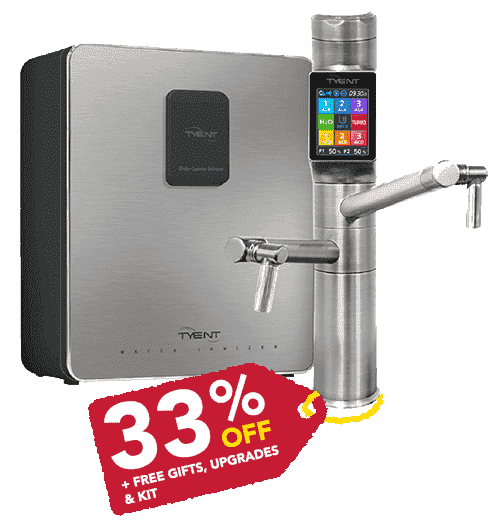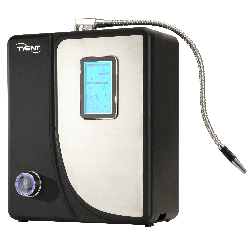The Most ALARMING Distilled Water Side Effect
The Biggest Drinking Distilled Water Side Effect
Distilled water is generally safe and healthy to drink. However, there are slight concerns that people should be aware of before exclusively drinking distilled water over a long period of time.
 Distilled Water Does Not Contain Healthy Minerals and Nutrients
Distilled Water Does Not Contain Healthy Minerals and Nutrients
The biggest disadvantage of using and drinking 100% pure water is that it does NOT contain any of the healthy minerals that naturally appear in water.
This leads some people to say that it doesn’t give you any nutrients there for damages your health in some way or doesn’t properly hydrate you. But there is no scientific or compelling evidence to support this.
However, anyone who finds this concerning should consider adding minerals back into their distilled water before drinking. For example, adding a slice of lemon to water before drinking or get a machine that ‘re-mineralizes’ after distilling.
What Is Distilled Water?
Distilled water is water that comes from the steam of boiled water.
The clean steam of boiled water (i.e. distilled water) is captured in a separate clean container and then cooled down for later use.
This process gets rid of ALL impurities and water contaminants. This includes things like minerals and any other substance in the water leaving you with completely pure water.
Because it is so pure, it is often used by hospitals, scientific laboratories, in aquariums, for brewing beer and some people like drinking it.
![]()
DIY Water Filter: How To Make Distilled Water?
To make distilled water, there are 2 super easy steps:
(i) boil water and,
(ii) capture the steam in a separate container.
Q. Why does the water distillation method work?
A. Because most contaminants (and minerals) have a higher boiling point than water, which means they get left behind.
Q. Is there an easy way to make distilled water?
A. Yes, you can buy a home water distiller. They are sometimes called a single-unit distiller. The machine heats up the water until boiling point and the steam is condensed into a separate container.
The steam is drawn away, cooled and condensed into water, leaving the contaminants in the first container.
Q. What if I need a large amount of distilled water?
A. You can get a vapor-compression distiller which can produce up to 5,000 gallons of water each and every day. Alternatively, you might need to try an industrial size water distiller that produces much more. ![]()
Benefits of Distilled Water
Distilled water has distinct benefits over other types of water filtration and purification methods. Here are just some of them:
1. Distilled Water Is Bacteria and Germ Free.
Although tap water is acceptable to drink in most Western countries, they still contain small amounts of germs. You can expect your tap water to contain things like viruses and bacteria (within accepted safety limits). However, these microbes are not present in properly distilled water.
2. Distilled Water Is Toxin and Chemical Free.
This is because all of the impurities in water stay behind during the distillation process. The result is that this filtration method is fairly effective at removing chemicals and toxins, which are difficult for other forms of filtration.
When water is properly distilled, it contains no herbicides, pesticides, or chemicals as it’s 100% pure.
3. Distilled Water Is Free of Chlorine.
Chlorine is one of the most common methods of disinfecting water and it has been that way for over 100 years. However, chlorine is NOT ideal for human consumption, even though it is safe within certain limits. Furthermore, many people do not like the smell or taste of chlorine in water. Properly distilled water contains no chlorine.
![]()
Distilled Water Facts Vs. MYTHS
There are several myths about drinking distilled water.
1. Distilled Water Leads to Health Problems Because It Has No Minerals.
 NOT TRUE.
NOT TRUE.
Drinking water that does not contain any minerals will still hydrate you.
Yes, you will miss out from the benefits of consuming the healthy nutrients that naturally come with water but you can easily consume this from other sources.
If you already have health concerns or say, pregnant, then you should seek expert medical advice.
2. Cooking With Distilled Water Leads To Mineral Loss.
NOT TRUE.
Minerals will be lost during the cooking process irrespective of what type of water you use.
If you choose to cook with pure water, it will not mean your food will lose any more minerals than if you use tap water.
3. Distilled Water Causes Dental Decay and Discolored Teeth.
NOT TRUE.
This myth comes from the fact that things like fluoride are removed from water during distillation. However, you can still maintain good oral hygiene by brushing your teeth with toothpaste etc.
Also, there is no evidence that 100% pure water is the direct cause of things like tooth decay or discoloration.
4. Distilled Water Is Too Acidic.
Hmm Maybe.
Removing minerals from water will make its pH lower and therefore it will taste slightly more acidic than tap water.
However, there is no evidence that this can cause you any harm. The average body of a healthy person is very efficient at maintaining its pH levels.
5. Bottled Water Is Distilled
It Depends.
It varies from brand to brand. The filtration method for some brands are through reverse osmosis for instance, Aquafina and Dasani, but this is not classified as distilled. Other brands come from natural spring water and will be advertised as such (e.g. Evian).
If you want to know how the bottle water was filtered, simply read the label or check the website.
5. Babies Can Drink Distilled Water
Yes, after 6 months.
You should not give babies under 6 months water to drink. This is because a baby’s stomach is small so water will quickly fill them up.
The result will be they don’t have enough space for their breast milk or formula, which is essential to their early development because it’s their main source of nutrients.
Any liquid and hydration that your baby needs is already present in breast milk, which includes everything a baby needs to grow and also replaces what they lose through urine.
A small amount of ultra pure water is fine for babies under 6 months if you want to mix it with formula.
6. Drinking Distilled Water Promotes Weight Loss
NOT TRUE.
Drinking water is generally a good thing for weight loss. However, there is no clear evidence that shows pure water from distillation leads to better results than any other type of water.
![]()
Can You Drink Distilled Water?
The short answer is yes.
It is not harmful in anyway and in fact could be good for people with weakened immune systems because it’s 100% pure.
However, people scorn it because of its “flat-taste”. Drinking it continuously also means that you’re potentially missing out on many healthy minerals and nutrients in water.
Can Drinking Distilled Water Lead To Death?
Despite all the Internet hype and scary stories, drinking distilled water does NOT kill you.
At least according to all the scientific based evidenced available. It is 100% pure water that doesn’t harbour any harmful germs or bacteria. Also, it does not appear to have any negative health effects.
Having said that, I personally would opt for water that contains healthy minerals that nourishes my body.
Distilled Water pH
PH is the way we a measure a solutions ratio of hydrogen atoms to hydroxide radicals. If the ratio is 1:1 then the solution is neutral and this is represented by a pH of 7.
However, the pH of this type of water depends on a number of things but one of the most important being how long it’s been exposed to air. The amount of air exposure can make the distilled water range anywhere from 5.5 to 6.9 in pH.
![]()
Distilled Water Brands
| Distilled Water Brand | Notes / Description | pH | ORP** (Oxidation Reduction Potential) | Fluoride Content [mg./liter] | |
| Function Water | Distilled water with added minerals | 5.0 | N/A | N/A | |
| Gerber Pure Water | Purified water from distillation and reverse osmosis. It also has the following minerals added: calcium chloride, potassium bicarbonate, magnesium sulfate. | 6.5 | +297 | 0 | |
| Smartwater | Distilled and remineralized with calcium chloride, magnesium chloride, and potasium bicarbonate. | 6.0 | +296 | 0 |
**ORP = is a measure of the cleanliness of the water and its ability to break down contaminants. It has a range between 0-800 and the higher the number, the cleaner it is. Most drinking water is between +200 to + 400
![]()
Distilled Water vs. Purified Water Comparison Table
Distilled Water |
Purified Water |
| Distilled water is the condensed steam from boiled water. | Purified water is water that has been purified to remove any contaminants or chemicals by different methods. For example, carbon filtration, reverse osmosis, deionization and yes, even distillation! |
| Removes EVERYTHING from water including minerals. | Can leave naturally occurring minerals in the water (e.g. if you use reverse osmosis). |
| Purest form of water. | Will produce clean water but not always 100% pure. |
Which Is Best? Distilled Water vs. Purified Water?
Let’s just put aside the fact that distillation is a form of ‘purified water’.
The bottom line is that distilled water doesn’t give you any healthy nutrients and minerals so I would personally go for a purified water like carbon filtered water. This will give you clean water that also includes naturally occurring minerals, which I think is better for long-term health.
It is good for certain situations or to drink on occasion but for daily long-term use, I recommend purified / filtered drinking water.
![]()
Purified Water vs Spring Water
Purified water = Water that has undergone some type of mechanical filtration process. Methods of water purification include things like reverse osmosis, ultraviolet oxidation and distillation.
Spring water = Natural water that comes from places like the bottom of a valley or side of a hill. When you buy a bottle of spring water it means it comes from “natural” sources and has gone through minimal filtration.
Spring Water |
Purified Water |
| From natural sources and lightly filtered. | Comes from any sources but heavily filtered. |
![]()
Distilled Water vs Spring Water
Distilled water = water that comes from condensed boiled water. It is usually 100% pure and completely empty of minerals.
Spring water = Natural water that comes from places like the bottom of a valley or side of a hill. When you buy a bottle of spring water it means it comes from “natural” sources and has gone through minimal filtration.
Spring Water |
Distilled Water |
| From natural sources and lightly filtered. | Heavily purified water from boiling water. |
| Includes many of it’s original natural nutrients and minerals. | Does not include any minerals as it’s 100% pure. |
![]()
What Is Distilled Water Used For?
Water distillation has been going on for many years and originally used to remove salt from sea water.
The fact that it is generally free from germs, toxins, chemicals and minerals makes it perfect for places where hygiene and sanitation is most important. For instance, factories, chemistry labs and hospitals.
Here are a few more uses:
- Ice cubes: If you are looking for something that will never spoil the taste of your drink.
- Coffee, tea, and hot chocolate: To get an even richer, fuller flavor.
- Fruit juices: Enhance the freshly squeezed taste.

- Savoury cooking: Emphasize the natural taste, not to mention appearance of foods.
- Baby care: Use this pure water for baby formulas, herbal tinctures and inhalation therapy.
- Low sodium diets:Perfect if you want to keep an eye on your intake of a certain mineral.
- Pet care: If your pet is on a strict diet or has health issues, this type of water might help.
- Skin complexion care: You can use it to cleanse your skin daily if you want to avoid pore-clogging impurities.
- Keep your aquarium clean: Not to mention clear and chlorine-free.
- Wet-cell batteries: Helps with battery power and longevity.
- Agriculture: It makes nutritious sprouts and vegetation grow very well.
- Steam irons and humidifiers: This is good if you want to avoid things like damaging scale buildup. It also means a longer product life.
| ACE(Above the Counter) Alkaline Water Machine | UCE (Under the Counter) Alkaline Water Machine with Faucet Above Counter |
| Hydrogen Boost Technology? YES | Hydrogen Boost Technology? YES |
 |  |
| Counter top machine connected to tap faucet ONLY. | Under counter unit WITH counter top touchscreen faucet. |
| 3 Acidic, 4 Alkaline, 1 Turbo (for both alkaline and acidic output) 1 Neutral. Fully adjustable with 99 presets per level. | 3 Acidic, 3 Alkaline, 1 Turbo (for both alkaline and acidic output) 1 Neutral. Fully adjustable with 99 presets per level. |
| 1.7-12.5 | 1.7-12.5 |
| Up to negative 1150 | Up to negative 1150 |
| x2 with .01 micron | x2 with .01 micron |
| Filters last 9 months or 3600 litres (approximately). | Filters last 9 months or 3600 litres (approximately). |
| YES comes with x13 mesh/solid hybrid plates baked and dipped. | YES comes with x13 mesh/solid hybrid plates baked and dipped. |
| 100-240V a.c 50/60 Hz | 100-240V a.c 50/60 Hz |
| A voice operation system with MP3 sound quality. | A voice operation system with MP3 sound quality. |
| Counter top ionizer: 14in (W) x 5-3/8in (D) x 14in (H) | Under counter ionizer: 14in (W) x 5-3/8in (D) x 14in (H) Counter top faucet dispenser: 11.5in (H) x 2in (D) |
| 1 - 5 bar (water pressure). | 1 - 5 bar (water pressure). |
| YES - flood prevention safety sensor. | YES - flood prevention safety sensor. |
| Self-Cleaning | Self-Cleaning |
| LIFETIME warranty when you buy direct and use code: WaterGeek | LIFETIME warranty when you buy direct and use code: WaterGeek |
| Yes. COUPON CODE: WaterGeek | Yes. COUPON CODE: WaterGeek |
 |  |
 |
|
Scientific References
Anjaneyulu, L.; Kumar, E. Arun; Sankannavar, Ravi; Rao, K. Kesava (13 June 2012). “Defluoridation of Drinking Water and Rainwater Harvesting Using a Solar Still”. Industrial & Engineering Chemistry Research. 51 (23): 8040–8048.
Down the Susquehanna to the Chesapeake By John H. Brubaker, Jack Brubaker page 163
Kozisek F (1980). “Health risks from drinking demineralised water” (PDF). Nutrients in Drinking Water (PDF). World Health Organization. pp. 148–59.
Sandle, T. (July 2004). “An approach for the reporting of microbiological results from water systems”.
Resistivity / Conductivity Measurement of Purified Water, Lab Manager Magazine.








Thank you for putting this up, I appreciate your well-rounded information! The tap water in my city has tested high in carcinogens that cause cancer, as well as arsenic and selenium. Is a carbon filter enough to remove the chemicals they put in the water to treat it? Or would it require reverse osmosis? Thank you for your time if you’re able to reply!
Hi Jessica
I would say arsenic is the biggest problem on your list because without it, you would have been able to use many different filter methods.
Unfortunately arsenic is so difficult to treat that you would need a specialist filter for a very high level of contamination.
Because of this I would say reverse osmosis is your best option. The one I linked to treats arsenic, fluoride and the other things they typically put in city tap water.
Stay hydrated,
Luke
Hi all,
I’ve been drinking DW for about 4 months. The first 1-2 weeks I noticed an increase in stool. My the DW detoxing all the bads out my system. Then week 3 and up I felt normal. I notice food cook taste better and tea when I use it. I have two dogs and I did a test of two bowl water one with DW and tap water, I did it 10 times and my dog will always drink the DW and ignore the tap water.
Overall I feel great, food taste better and I have notice and increase in energy. I use to take naps after work but since then I do not get tired and can go a day without taking naps.
Good day Thanks!
I have heard that if you add a small amout (ie. 1/4 tsp to gallon of water) of himalayan pink salt to distilled water it will put back the lost natural trace minerals. Does this solve the problem?
Most definitely Sarah, you got it in one, please people wake from your media dream…
I’ve always been raised/drank distilled water. Any other type water I drank/used in foods & drink since birth lead me from colic to IBS-D today.
DW has helped with allergies, arthritis, autoimmune disorders, sun sensitivity, and hopefully the HER-2 positive breast cancer ++ I am battling now.
I have faith DW will inhibit cancer spread and will filter poisons/medication build-up/antioxidize my bones, bloodstream, and organs.
I am with you!
KLS
Note: if I drink any other kind of water I become ill, then very sick after awhile.
P.S.: cooking/using with DW shows less degradation in coatings/finishes/sealants on your cookware, serving ware, flatware, and glassware!!!
Hi Kerry,
Many thanks for stoppping by and leaving a comment 🙂
I wish you a speedy recovery and a future full of lots of good health.
Stay hydrated,
Luke
I’ve been drinking distilled water for about two months. It is amazing! My sinuses have never been this clear my whole life. I can see colors so much more vibrant and I don’t need my glasses anymore. Even the brain fog I didn’t know I had went away. I can only assume my whole body will see benefits after long term use.
distilled water is a refined food! there were minerals in it and they removed them, its like comparing white flour to whole grain. all that aside its more acidic my acid reflux definitely increased, its less hydrating because it causes you to pee more and in doing so you lose minerals which is a well known side effect of any diuretic. I say most of this because my quality of life when I drank mineral-less water for a few years was horrible and through process of elimination I realized it was the water and all these symptoms started improving. Oh but some artile on the interenet says none of those things are true so it must be true lol. read some actual evidence like the study WHO conducted.
Anyone who sights the WHO as a reputable source after 2020 needs to do more research themselves.
Great comparisons! I enjoyed reading especially the part about the facts and myths of distilled water. I’m not particular with the water I drink though I grew up drinking purified water.
I personally want to share my experience with distilled water. The very first day I started drinking distilled water I had some sort of heart problem which put me in the bed for 3 days sleeping day and night rarely getting up. I don’t think it was the distilled water, but I’m not 100% sure. I will say that prior to starting to drink distilled water, I was not eating healthy, This is what I think caused the problem I had that day.
Since I thought it was my previous eating habits, I kept drinking the distilled water. I noticed right away my urine didn’t have the bubbles in it. Soon My urine was clear and flowing much faster, I feel better in the mornings and love drinking the distilled water, Im most concerned about the mineral issue. Why am I not seeing anyone make the distinguish the difference between inorganic and organic minerals. Is this intentional? I understand that normal water has inorganic minerals and therefore are not good for the body at all. So unless Ive been mislead I really don’t understand why anyone would be concerned about minerals in water at all. Please help me understand if I’ve got this wrong. If not please help me understand why everyone is being deceived by this misconception. IF the water has minerals of positive charge/ inorganic and its not good or of any use to our body why would we want that? In fact isn’t it a known fact that health problems are actually caused by these inorganic minerals? Like Kidney stones, heavy metals in the brain causing Autism and Alzheimer.
I think that any type of water is going to flush good and bad things out of the body, regardless if its tap water or filtered/ distilled. The thing I wonder most is why Doctors would act like inorganic minerals are important to the body and talk down on drinking distilled water, without telling the whole story; I find that misleading and frustrating. Please disregard any frustrations I have, I truly want to know your take on this.
Hi Tim
Many thanks for sharing your experience with the rest of us! I don’t think distilled water is better or worse for you, it’s all down to personal preference so long as the water is clear of contaminants (which distilled water is). It’s a very complicated issue as each person is different so your best bet is to speak to a healthcare professional who can give you personalised health recommendations as I understand some of this is affecting your health too…
I wish you all the best and let me know if I can be of any further assistance 🙂
Luke
Mr Water Geek
There are most definitely some huge misunderstanding about which minerals are good for you and which is not. And it seems to be the same idea about the forgetfulness of the inorganic/organic thing.
I have been engaged in different kinds of water analysts here in Denmark, testing the water coming from the tap and the water coming from the huge purification plants. They both have around the same types of pollutants. 100’s of different kinds, even diseases, heavy metals, and nerve poisons. Everything comes directly out from the plant, which makes me wonder, what does it even clean? While we can make the cleanest water in the world with a pot and a gutter, what is it really we need these enormous plants for? It seems that we do not talk enough about this and it looks more like they are adding all this inorganic *bs that is not good for us, sorry my language.
*expletive removed
Hi, after reading this remarkable paragraph i am too glad to share my know-how here
with mates.